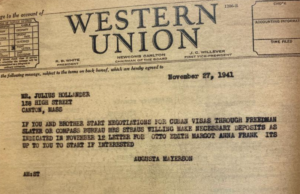Canton’s True Tales: A Telegram to 138 High Street
By George T. ComeauJulius Hollander arrived in New York City on April 5, 1938. The trip from Rotterdam was uneventful, despite the fact that German U-boats were frequently targeting both military and passenger ships, making the crossing to the United States extremely dangerous. Back in Amsterdam, Julius’ brother, Walter, was in a Jewish refugee camp and was awaiting departure to join his brother. The two men saw that escape from the Nazis was critical to their own survival and to their family.
By December 1939, Walter was discharged from the camp as he had procured a visa and a ticket to the United States. Both of the brothers had been well educated and had received a “thorough education in business.” They were from Aachen, Germany — on the Dutch and Belgium borders. In Aachen they had been respectable businessmen and had served on the boards of several charitable organizations. In America there was safety for these Jews, but also a reset. The work they would do here was much more menial and the pay was meager.
Walter wound up working as a laborer at the E.F. Dodge Company in Leominster for $20 a week. Julius did slightly better; arriving in Canton around 1940, he took a night job tending the furnaces at the Canton Japanning Company on Neponset Street. Julius was paid 60 cents an hour and would take home $28 a week. Both brothers found small rented rooms in their respective communities. The japannery made patent leather and was located where the small industrial park is today on Neponset Street, just as you leave Canton on the left.
In Canton, there was a small and influential Jewish community that worked to help each other against a rising backdrop of anti-immigration sentiment. The neighborhood on High and Tolman streets was home to the Myers, Sherr, Danovitch and Swardlick families. The Swardlicks were of Russian, Polish and Lithuanian descent and came to Canton before 1920. They had lived on Tolman Street and bought a small house at 138 High Street in 1921. In 1927, Max Swardlick had been crushed in an elevator accident at Plymouth Rubber, leaving his wife, Mary, with six children. One of the children, Sam, would go on to become the president of Republic Plumbing. In the late 1930s Sam attended Northeastern University and Mary rented a room in the house. From 1941 through 1942, that was the house in which Julius typed letters that failed to change the course of history.
The singular goal for the 47-year-old man was to save his family. The whole of his savings was intended to “buy” the freedom of his mother, sister and his two nieces. Julius’ brother-in-law, Otto, was increasingly fearful of staying in the Netherlands after having moved from Frankfurt, Germany, to avoid the dark shift in politics and persecution of the Jewish people. By May 1940, the family became trapped in Amsterdam by the German occupation of the Netherlands.
In April 1941, Otto wrote to a friend, “Who can tell if there is still a chance to leave Europe by the time this letter is going to arrive.” At the same time, Julius was sitting in his room on High Street at a typewriter and working on behalf of his brother-in-law and the family. “I have information that transit visas for Cuba are available again,” he wrote. “I would appreciate it if you would assist me in obtaining a visa for Mr. Otto Frank as soon as possible.”
Julius and Walter were Anne Frank’s uncles and they feverishly worked to secure freedom and their very lives. As one historian writes, “The prospect of being able to bring their family to the United States lent purpose to their work.” Their accumulated savings was $2,900. In order to secure a U.S. visa, the Hollanders would have to prove that they could support five people on their laborer wages. This would prove to be impossible. At the same time, Otto Frank had a very influential friend in America who could help, and Julius Hollander was the key to the communications that ensued.
Otto Frank had been a roommate with Charley Straus, the heir to Macy’s. In 1907 Frank and Straus had met while Straus was on leave from Princeton and studying in Heidelberg. Over the years they stayed in touch and even vacationed together. Charley changed his name to Nathan Straus Jr. and as his fortunes rose, he became extremely influential and a friend to Franklin Roosevelt. Straus was the head of the U.S. Housing Authority, a New Deal agency, and was very well connected. Frank confided in his friend, “You are the only person I know that I can ask: Would it be possible for you to give a deposit in my favor?”
On July 1, 1941, the immigration laws changed and Strauss wrote to Frank, “I am afraid, however, the news is not good news.” A new strategy emerged. Here in Canton, Julius Hollander would be key to helping the Frank family find a way out of Nazi-occupied Holland. Julius writes to Strauss, “It would be impossible for me to obtain an immigration visa for this country without your assistance.”
The plan that had emerged was to procure a transit visa from Cuba at a steep cost of a visitor visa for $250, a boat ticket for the family at $550, and the bond of $2,500 per person to be refunded after they left Cuba. The entire family would have to leave for Cuba and apply for a visa to enter the United States. Strauss had pledged to arrange for a bank deposit of $2,000 per adult and the bonds necessary as well as the tickets needed for passage. The money would amount to several thousand dollars to secure the life of the entire family.
On Thursday, November 27, 1941, a Western Union Telegram was received in the Canton telegraph office and sent to Julius Hollander on High Street: “If you and your brother start negotiations for Cuban visas … Mrs. Straus willing to make necessary deposits as indicated … for Otto Edith Margot Anna Frank. It’s up to you to start if interested.”
There must have been cautious happiness, which was shattered 11 days later when the Japanese attacked Pearl Harbor. On December 11 the United States entered the war and Julius Hollander’s application for Otto Frank’s Cuban visa was cancelled that same day. As persecutions of the Jewish population increased on August 4, 1944, the Frank family went into hiding in some concealed rooms behind a bookcase in the building where Otto Frank worked.
Otto Frank survived the horrors of Auschwitz and died in Switzerland in 1980. Edith, his wife, died of starvation at Auschwitz. Anne and Margot died of typhus within days of each other at Bergen-Belsen. In mid 2005 a research volunteer happened upon a file in a manilla folder at YIVO: The Institute for Jewish Research. The file was marked “Otto Frank.” Looking in the folder, she saw the daughters’ names and birth dates and realized that this was Anne Frank’s father. Within the files are the letters and correspondence from Canton. The letters revealed for the first time that Otto Frank tried desperately to get his family out of war-torn Holland in 1941, 15 months before they went into hiding.
There are three letters in the file that end the story. In June 1945, Julius appeals to the National Refugee Service’s Migration Department for assistance in contacting the Franks, having been mistakenly informed that they were alive and living in Paris. A second letter comes to Julius in 1946. The National Refugee Service writes with information that Otto Frank is in Amsterdam, Edith is deceased, and the daughters are still missing. The final letter in February 1946 closes the tale, as Julius informs the Refugee Service that he has found his brother-in-law in Amsterdam. Only Otto survived.
The connection to Canton is an indelible reminder of the genocide that attempted to eradicate an entire people from this world. The house on High Street is a significant historical place where the hope and tenacity of Julius Hollander was crushed by world events and where even the most powerful were unable to intervene. Anne Frank’s words resonate to this very day: “Where there’s hope, there’s life. It fills us with fresh courage and makes us strong again.”
Short URL: https://www.thecantoncitizen.com/?p=74878












